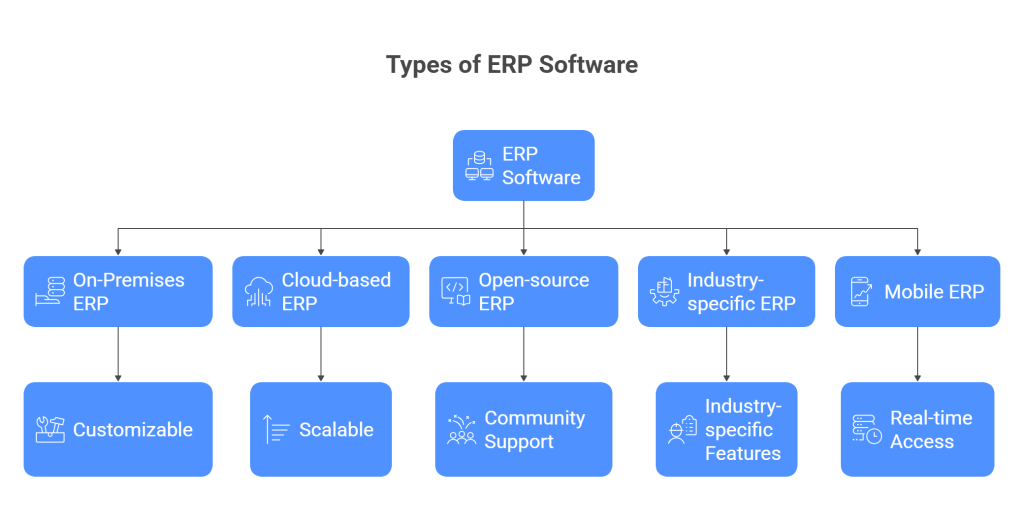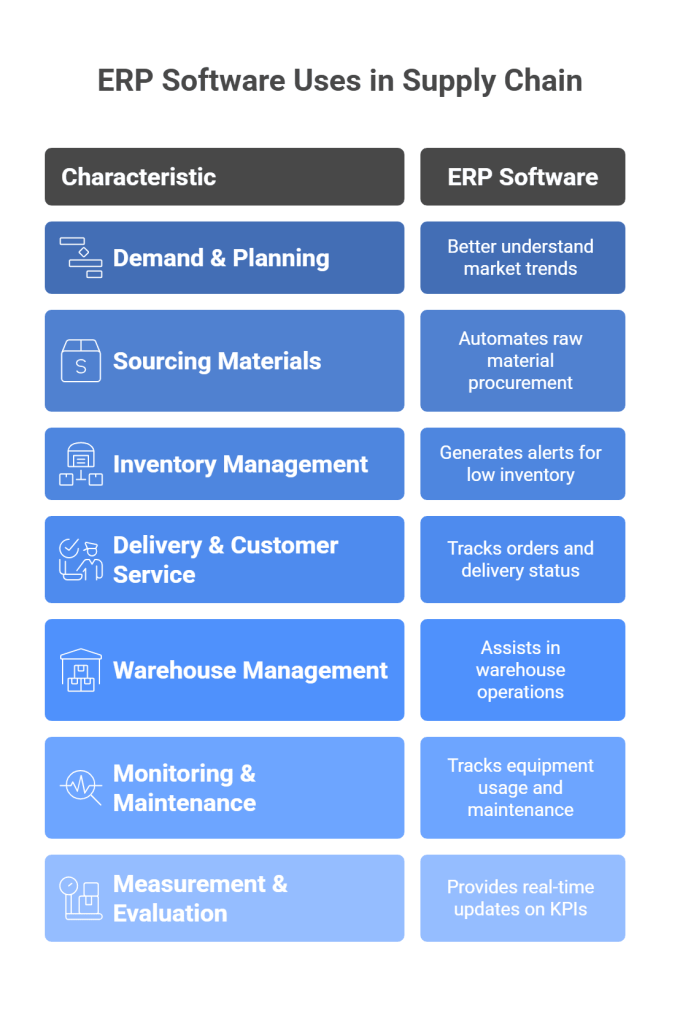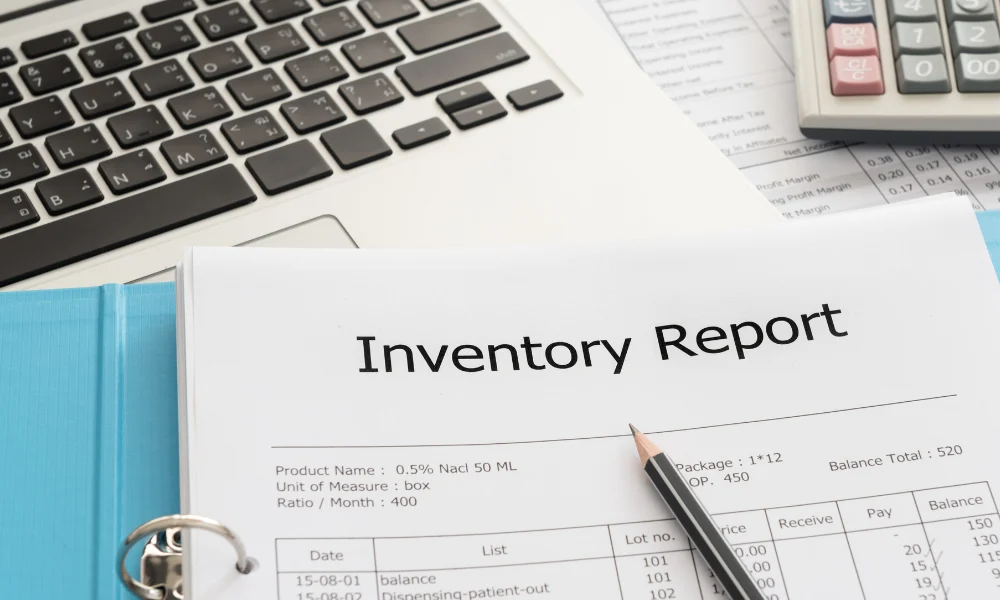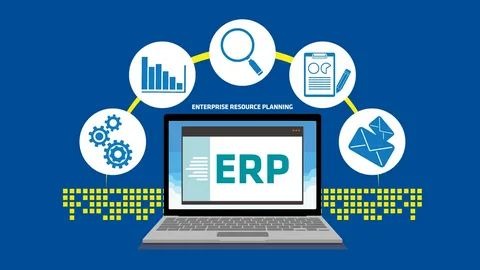Have you ever wondered how some companies are able to efficiently manage their supply chain? The answer lies in the use of ERP software. By leveraging the capabilities of enterprise resource planning (ERP) software, businesses can streamline and automate their entire supply chain process, from order fulfillment to inventory management.
In this blog post, we’ll explore what ERP software is and its role in supply chain management. So, let’s get started!
What Is ERP Software?
Enterprise Resource Planning (ERP) software is an umbrella business operations management solution with various applications that assist you in automating and managing your business operations. With ERP software types, including open-source ERP software, cloud computing in ERP, and supply chain management ERP, you can track every minute detail of your business operations within the supply chain.
You may also look at it as a centralized unified database of your company wherein all the information of your company and business operations are stored in an organized way. With all the information in one place, managers can make better decisions, reduce costs, and increase productivity.
Types of ERP Software

There are various types of ERP software, each of them designed to meet the specific needs of different businesses. Below listed are some of the common types of ERP software, such as open-source ERP software, cloud-based ERP, and industry-specific ERP:
1. On-Premises ERP
As the name suggests, on-premises ERP software is installed, hosted, and run on the company’s servers and infrastructure, wherein the company has complete control over all the data, system configuration, and security.
The best part about these software is that you can easily customize them according to your business and company’s requirements. This type of ERP software is ideal for larger organizations with significant IT resources and budgets.
2. Cloud-based ERP
Unlike on-premises ERPs that are dependent on the company’s infrastructure and servers, cloud-based ERPs are installed and hosted on remote servers, which you can access only through the Internet.
Cloud computing in ERP is revolutionizing the way businesses operate. Ideal for small and medium-sized businesses with minimal upfront investments, they focus mainly on core business operations. Moreover, they are flexible and scalable too.
3. Open-source ERP
With open-source ERP software, such as open-source ERP software, you can easily customize it according to your specific needs. Besides customization, it also provides businesses with access to a large community of developers who can offer support, share knowledge, and help resolve technical issues.
The best part about these open-source ERP solutions is that they are free to use, modify, and distribute. However, they may not offer the same functionality as other commercial ERP software solutions.
4. Industry-specific ERP
Pretty much like it sounds, industry-specific ERP software is designed for businesses of a particular industry. They have features and functionalities that are specific to the industry they’ve been designed for. Moreover, they are designed to meet the needs and demands of the particular industry.
For example, supply chain management ERP software may include features such as supply chain management flow and supply chain management warehouse, while manufacturing ERP software may include features such as production planning and inventory management.
5. Mobile ERP
Using mobile ERP software, you can access and manage their ERP system and all the information stored in it through mobile devices such as smartphones and tablets. What makes them so popular is their ability to provide real-time access to critical business data.
However, mobile ERP software has limited features and functionalities in comparison to others and require additional security measures to protect sensitive data.
Uses of ERP Software

ERP software plays a crucial role in supply chain management. Below listed are some of the uses of ERP software that justify their contribution to supply chain management, including supply chain management flow and supply chain management types:
1. Demand & Planning
With ERP software, you can better understand and analyze market trends and historical data. This helps supply chain managers forecast their customers’ demand and plan their course of operations accordingly. Thus, ERP software helps in the optimization of business resources, thus avoiding overproduction and underproduction.
2. Sourcing Materials
ERP software automates the procurement of raw materials by integrating with supplier databases. Thus, supply chain managers can identify the best raw materials and purchase them on time in the proper quantity, thus avoiding delays and any other errors.
3. Inventory Management
Not just this, ERP software also integrates with inventory management systems within your business’s supply chain. With the help of this integration, it automatically generates alerts when inventory levels fall below threshold limits and need to be restocked. Thus, ERP software also assists you in automating your inventory management.

4. Delivery and Customer Service
ERP software also helps businesses improve their delivery service and customer service operations. It does so by integrating with logistics and customer service systems, by which it has a track of all orders along with their expected delivery dates and current status. They also generate alerts if the delivery has encountered any issues.
5. Warehouse Management
With collaborations with all the management systems, including the warehouse management ones, ERP software also assists supply chain managers in their warehouse operations. This includes receiving, storing, and shipping products.

6. Monitoring and Maintenance
ERP software can help businesses monitor and maintain their equipment and assets. By integrating with maintenance management systems, ERP systems can track equipment usage, generate alerts when maintenance is due, and automatically generate work orders for maintenance tasks.
7. Measurement and Evaluation
With ERP software, you can access all the data and information under one roof. Moreover, they also provide real-time updates on your business’s KPIs, such as inventory levels, sales, etc.
Thus, starting from demand forecasting to planning operations, ERP assists you in every step of your supply chain management operations, including evaluation.
Benefits of ERP Software
ERP Software is the backbone of a successful, efficient, and profitable supply chain. It provides lots of benefits to business and supply chain managers. Let’s explore these benefits, including improved supply chain management warehouse, ERP software development, and ERP software solution:
1. Workflow Automation
ERP software integrates with all the major databases and applications, thus automating major business operations like inventory management, supply chain management, finance management, etc. As an umbrella business operations management solution, they provide all the major applications under one roof.
This eliminates manual labor, thus improving efficiency, accuracy, and productivity. Thus, ERP software automates and streamlines workflow management.
2. Flexible Supply Chain Solutions
ERP software offers flexible supply chain solutions that assist businesses in effectively managing their supply chains. Companies can use an ERP system to maintain inventory levels, monitor manufacturing schedules, and manage supplier relationships.
This improves supply chain performance by reducing lead times, reducing stock-outs, and optimizing inventory levels.
3. Fewer Bottlenecks
As ERP software provides real-time visibility across all business operations, you can easily identify problems and take corrective action quickly. This is crucial for removing bottlenecks, unexpected delays, and other unforeseen circumstances.
4. Increased Visibility
With ERP software, you have real-time updates on the whereabouts of your business operations. The best part about it is that it integrates data from various departments and provides a holistic view of the business’s performance. This real-time visibility helps managers make informed decisions and improve operational efficiency and productivity.
5. Reduced Costs
ERP software automates tasks and eliminates manual processes, reducing labor costs and saving time. Moreover, the software provides real-time visibility into operations, which helps businesses identifycost-saving opportunities and optimize their processes continually. ERP software download and ERP software types provide businesses with the necessary tools to achieve these benefits.
How will OneSETU by QodeNEXT benefit your business?
Do you want to make your supply chain management more efficient and effective? Then look no further than OneSETU by QodeNEXT!
Using our open-source ERP software, cloud computing in ERP, and supply chain management ERP solutions, you can streamline your operations and improve productivity.
With our master traceability engine, you can generate digital twins of finished goods and track their movements in real-time. Additionally, our ERP software development and ERP software solution provide you with a comprehensive set of functionalities to achieve consumer protection, supply chain visibility, statutory compliance, warranty tracking, and other crucial applications.
Conclusion
ERP software plays a critical role in supply chain management. It allows businesses to manage their operations more efficiently, resulting in increased productivity and improved customer satisfaction. By leveraging open-source ERP software, cloud computing in ERP, and supply chain management ERP solutions, businesses can optimize their supply chain processes and achieve better outcomes.
Well, as you’ve stayed with us till the end, we have a little surprise for you! Go and check out OneSETU by QodeNEXT! Our traceability software is going to leave you awestruck with its amazing functionality.
So, why wait? Make your logistics and supply chain management easier with our OneSETU.
FAQ: ERP Software
1. What is ERP software?
Enterprise Resource Planning (ERP) software is an umbrella business operations management solution with various applications that assist you in automating and managing your business operations.
2. What are the types of ERP software?
The common types of ERP software are: on-premises ERP, cloud-based ERP, open-source ERP, industry-specific ERP, and mobile ERP.
3. What is industry-specific ERP software?
Industry-specific ERP software is designed for businesses of a particular industry. It has features and functionalities that are specific to the industry it has been designed for.
4. What is the role of ERP software within supply chain management?
ERP software plays a pivotal role in supply chain management. Starting from demand forecasting to planning operations, ERP assists you in every step of your supply chain management operations, including evaluation.
5. What are the benefits of having ERP software for your business?
ERP software provides several benefits to businesses, including workflow automation, flexible supply chain solutions, reduced bottlenecks, increased visibility, improved efficiency, reduced costs, and increased customer retention.
6. How does ERP software help in demand forecasting?
ERP software uses historical data and market trends to help businesses accurately forecast customer demand, enabling better production planning and inventory control.
7. Can ERP systems integrate with inventory management tools?
Yes, ERP systems integrate seamlessly with inventory management tools to automate stock tracking, trigger reorder alerts, and optimize storage efficiency.
8. Is cloud-based ERP better than on-premises ERP?
Cloud-based ERP is ideal for businesses seeking lower upfront costs, scalability, and remote access, whereas on-premises ERP offers more control and customization for enterprises with robust IT support.
9. How does ERP software improve customer service?
By providing real-time visibility into order status and integrating with CRM systems, ERP helps businesses respond quickly to customer queries and ensures on-time deliveries.
10. Is ERP software suitable for small businesses?
Yes, especially cloud-based and open-source ERP solutions are budget-friendly and scalable, making them ideal for small and medium-sized businesses looking to streamline operations.







